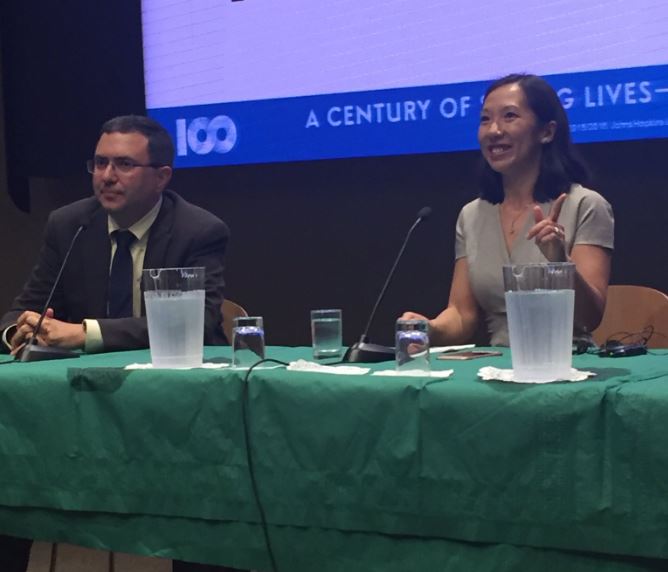How Policymakers Think: A Lesson for Aspiring Public Health Advocates
Wednesday Jul 13th, 2016

Public health is an interdisciplinary social justice tool that aims to reduce health disparities by addressing the root causes of inequality. It requires policymakers to actively listen to the needs of the communities they serve and to take action based on evidence and science.
On Tuesday, Dr. Wen joined former Baltimore City Health Commissioner Dr. Josh Sharfstein as a guest lecturer at the Johns Hopkins School of Public Health for a discussion on “How Policymakers Think.” During the lecture attended by more than 200 students, Dr. Wen spoke about the ways she makes decisions as health commissioner from a public health perspective and how she has overcome obstacles in her position and in her career.
“In order to deliver public health services, we need to meet people where they are,” Dr. Wen said. “It’s one thing to look at a city’s health using data and statistics, but being a public health advocate is about listening to residents and addressing their immediate needs. Public health often has very broad overarching goals, and in order to achieve them, we must work with the community to set short-term metrics in order to achieve long-term change,” Dr. Wen added.
At the lecture, several graduate students asked Dr. Wen for advice in their careers as future public health advocates. Dr. Wen responded that public health requires real world experiences beyond the classroom and research lab. Aspiring advocates should look for ways to volunteer and gain managerial experience to build their personal skill set.
“The best way to be an advocate for public health is to listen,” Dr. Wen said Tuesday, citing a recent BCHD co-led initiative, “Vision for Baltimore,” which will provide universal eyeglass screenings for students between pre-kindergarten and eighth grade and dispense glasses to all students in need at school during the school day.
Previously, BCHD performed vision screenings, as mandated by Maryland law, for pre-kindergarten, first grade, and eighth grade students only, less than 20 percent of students who needed glasses actually obtaining them. By identifying a visible need and applying a specific and targeted plan of action, this program will ensure that students across Baltimore City have access to these essential learning tools that can improve long-term academic performance, engagement, and opportunity.
Dr. Wen also answered questions about the challenges that she faces as a public health policy maker and as health commissioner. From navigating funding limitations to combatting special interest opposition to public health legislation, Dr. Wen stated that overcoming obstacles in public health requires a willingness to rally support from individuals within communities and by recruiting allies from diverse sectors, including local businesses.
“Being a public health advocate also requires viewing challenges as opportunities and setbacks as lessons for the future,” Dr. Wen concluded. “As long as you bring a passion for the job, and uncompromising resolve to forging ahead, there is very little we cannot accomplish.”
